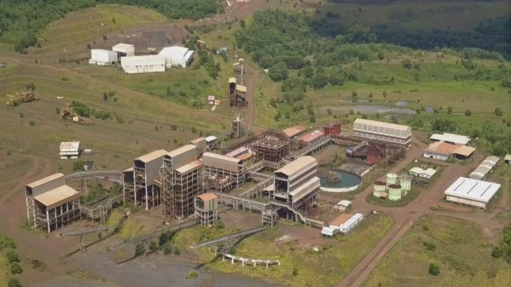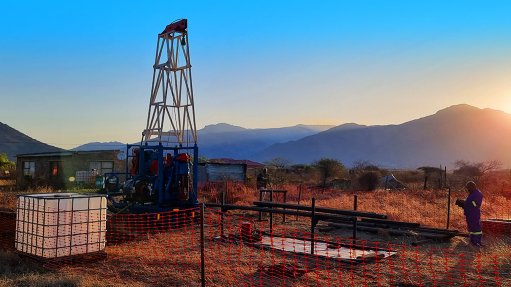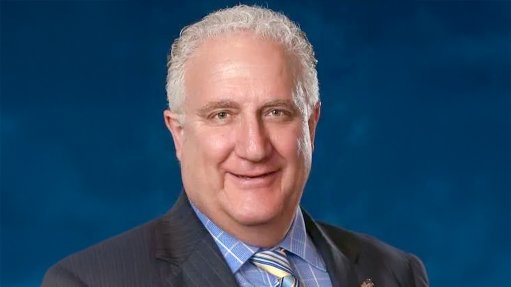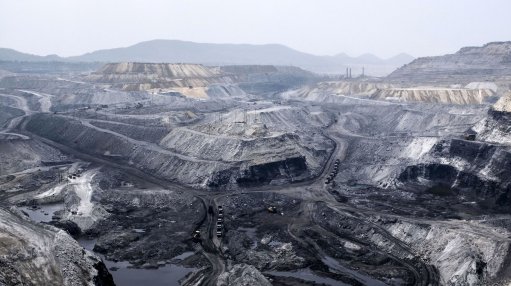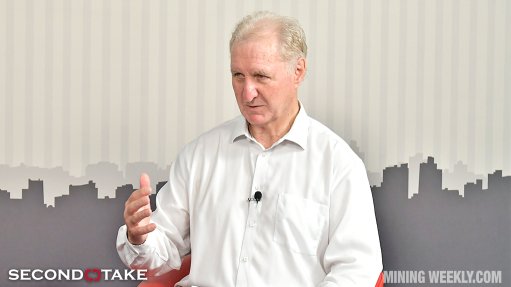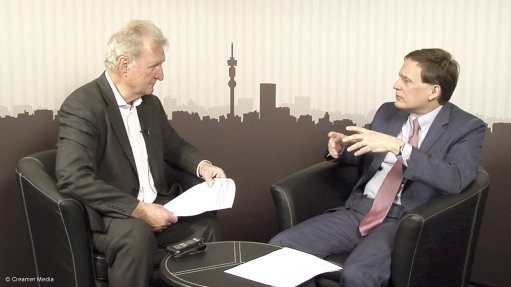Local company secures follow-up work, pipeline project

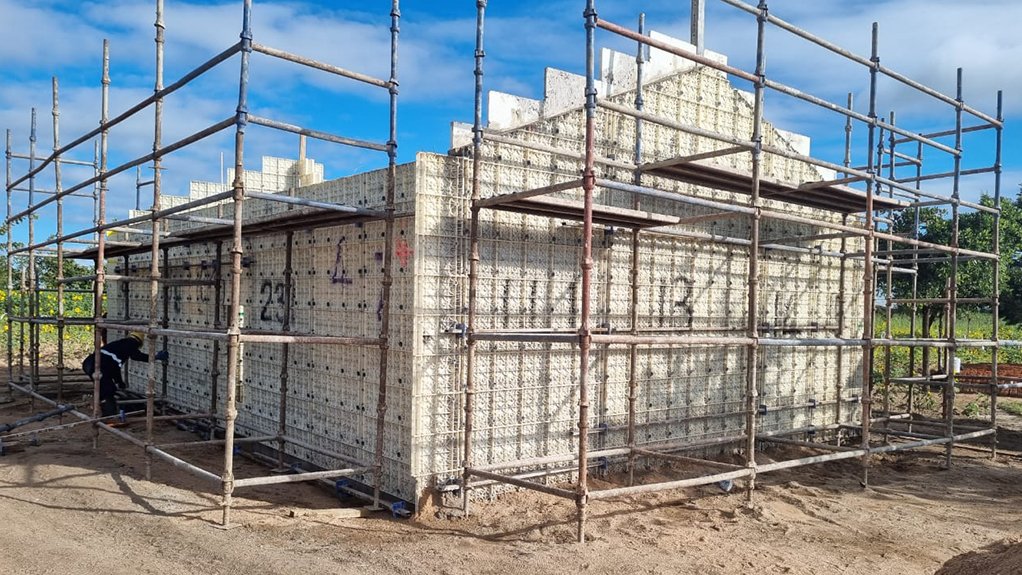
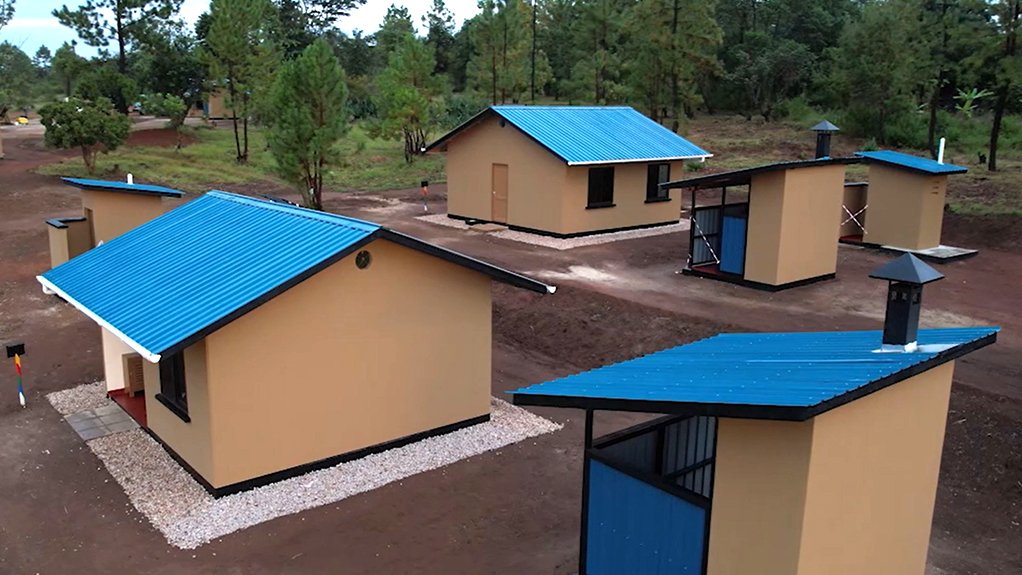
FORMWORK Lightweight injection moulded plastic formwork is erected on a conventional raft foundation, which takes three to four days to cure, depending on the climate
Photo by Moladi
HOUSE IT The total project consists of 2 200 units along the 1 700 km pipeline in Tanzania, which consist of electrified homes comprising bedrooms, a living room, a kitchen and a bathroom
Photo by Moladi
As it recently completed a project for diversified miner Ivanhoe Mines’ Kamoa copper mine, in Kolwezi, in the Democratic Republic of Congo (DRC), South African construction company Moladi has secured a second project for the Kamoa smelter.
The first project included the construction of accommodation that could house up to 3 200 beds, as well as 16 ablution blocks, for mine personnel.
Moladi has been contracted for a “repeat order”, says Moladi CEO Hennie Botes.
The structures built for the first project were completed in a relatively short period of 12 months, compared with the time typically required for brick-and-mortar construction, owing to the efficacy of Moladi’s system. The second project is likely to be completed within a similar time.
TotalEnergies Project
Botes says Moladi is involved in an ongoing project in Tanzania for energy major TotalEnergies.
TotalEnergies is laying a 1 700 km crude oil pipeline from Uganda to a port in Tanzania.
The total project consists of 2 200 units along the 1 700 km pipeline in Tanzania, which consist of electrified homes comprising bedrooms, a living room, a kitchen and a bathroom.
“The pipeline construction intersects with villages and/or surrounding communities throughout the 1 700 km, so Moladi will be relocating homes to accommodate those who are affected as and when needed.”
Botes says TotalEnergies had been negotiating with the affected communities for two years prior to the start of its pipeline project, as the company wanted to ensure the safety and satisfaction of the communities.
TotalEnergies offered two options: rebuilding the homes in a different location or reimbursing those affected so that they could find alternative accommodation.
“Most residents initially chose the second option, as it was more attractive; however, when Moladi started building, the very same residents changed their decisions and asked for a new home rather than the money,” he adds.
During the construction process, lightweight injection moulded plastic formwork is erected on a conventional raft foundation, which takes three to four days to cure, depending on the climate. Once erected the formwork is filled with mortar and the formwork is removed the next day and re-erected on the new adjoining raft foundation.
Botes says that Moladi’s construction process can withstand the same weather- and environment-related challenges as masonry.
Local sand is mixed to produce the mortar that is used to fill the formwork. This process takes about two hours to complete.
“The local sand is tested in the Moladi laboratory in Johannesburg. This test includes designing the mix ratio to enhance the thermal properties to best suit the Tanzanian climate.”
Botes adds that one of the company’s major principles is upskilling unskilled labourers, hence its projects will always include local community members in the construction process.
He believes that it is imperative that companies, such as Moladi, teach people how to complete tasks that will aid them in future endeavours, and contribute to job creation.
Further, in terms of longevity, the first house cast by the company was completed in 1987, in Benoni, Gauteng. It was inspected last year by financial services firm First National Bank to determine the quality of the structure after 34 years and the feedback was positive, Botes notes.
He says Moladi continues to uphold its reputation, as it has been requested to take on multiple projects – such as implementing the technology for 12 000 houses in Mauritius, and accommodation for mine personnel in Malawi – during the next few years.
Article Enquiry
Email Article
Save Article
Feedback
To advertise email advertising@creamermedia.co.za or click here
Announcements
What's On
Subscribe to improve your user experience...
Option 1 (equivalent of R125 a month):
Receive a weekly copy of Creamer Media's Engineering News & Mining Weekly magazine
(print copy for those in South Africa and e-magazine for those outside of South Africa)
Receive daily email newsletters
Access to full search results
Access archive of magazine back copies
Access to Projects in Progress
Access to ONE Research Report of your choice in PDF format
Option 2 (equivalent of R375 a month):
All benefits from Option 1
PLUS
Access to Creamer Media's Research Channel Africa for ALL Research Reports, in PDF format, on various industrial and mining sectors
including Electricity; Water; Energy Transition; Hydrogen; Roads, Rail and Ports; Coal; Gold; Platinum; Battery Metals; etc.
Already a subscriber?
Forgotten your password?
Receive weekly copy of Creamer Media's Engineering News & Mining Weekly magazine (print copy for those in South Africa and e-magazine for those outside of South Africa)
➕
Recieve daily email newsletters
➕
Access to full search results
➕
Access archive of magazine back copies
➕
Access to Projects in Progress
➕
Access to ONE Research Report of your choice in PDF format
RESEARCH CHANNEL AFRICA
R4500 (equivalent of R375 a month)
SUBSCRIBEAll benefits from Option 1
➕
Access to Creamer Media's Research Channel Africa for ALL Research Reports on various industrial and mining sectors, in PDF format, including on:
Electricity
➕
Water
➕
Energy Transition
➕
Hydrogen
➕
Roads, Rail and Ports
➕
Coal
➕
Gold
➕
Platinum
➕
Battery Metals
➕
etc.
Receive all benefits from Option 1 or Option 2 delivered to numerous people at your company
➕
Multiple User names and Passwords for simultaneous log-ins
➕
Intranet integration access to all in your organisation








